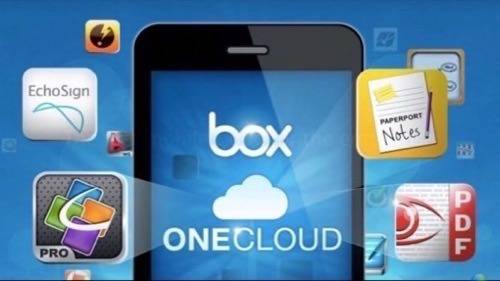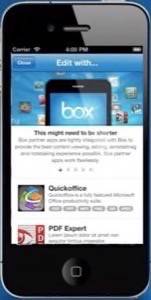
Starting now, you’ll be able to download enterprise-class apps that directly use your Box.net cloud-based workspace, and build what is essentially a virtual desktop around that space. The OneCloud service from the company we now call just “Box” launches today, with nearly three dozen apps in the charter ecosystem, including an iOS version of QuickOffice, the well-known office productivity suite for smartphones.
The goal, which Box VP for Platform Engineering Matthew Self articulated for ReadWriteWeb in an interview, is to eventually enable a cross-platform cloud deployment complex, where all your files in the cloud can be created and edited by apps for iOS, Android and eventually Windows 8 Metro.
“We’re transitioning from a world where the enterprise, and all of your enterprise content, are within the confines of your network and with applications you control, to this world where you have the cloud, all these different applications and all these different devices, with their content scattered all over the cloud. What Box is introducing is a solution… that will bring all of that content to a single place. By using Box OneCloud, we can leverage all of the applications that businesses want to use to run their business, and store the data in a single place.”

In recent months, consumer-driven storage services like Box and Dropbox have made very fast inroads into enterprises by way of iPad users who need to sync their files across devices. IT departments have been pushing back, looking to establish policies that forbid such services, since they often end up containing confidential files whose accessibility enterprises cannot control.
So to pre-empt this flood of new users from being shut off, Box is building an enterprise apps platform around the storage space. Just like using Finder on the Mac, Self says, you tap a file stored in your Box workspace, and when you’re licensed to use the app associated with it, that app opens in-place.
“With QuickOffice, for example, we just open up with that document – [the user] doesn’t need to know where it came from or how it was accessed from the cloud, or any of those details. They can just concentrate on their expertise, which is editing the document. When they save back to Box, it actually saves it back to the Box iPad application, and we take care of storing it back into the cloud using the user’s credentials.”
Self tells RWW that Box will be managing those credentials on behalf of apps that use Box for their cloud storage spaces. This may be a boon to developers who are looking for any help they can get to enable single sign-on (SSO). “For the developers, this is a huge opportunity for them because it lets them concentrate on editing documents and providing their services, without having to build an entire cloud ecosystem just to be able to read and store documents,” Self says.
It also shifts a very critical burden onto the shoulders of one company. In the past, an operating system was defined as a control program for launching other programs around a storage device. Essentially, that is what Box.net has become – by the original standard, Box is an operating system, just not on your tablet or your PC. But maybe it doesn’t need to be there now, anyway.

In an indication that Box knows full well what it’s getting itself into, Self tells RWW the company is extending certain technical benefits to enterprise cloud app developers that use Box as their storage device of choice. Saving document data back to Box is one example of what it’s calling app-to-app integration – which is essentially the same as extending its resources to other programs, like any other operating system. Remarks Self, “It’s less than a day’s work for applications to integrate with Box OneCloud.” He tells RWW the company is considering revenue sharing with its apps partners, but for now, it will simply provide those partners a platform for selling their products under their own licenses.
The enterprise-based environment, Self says, will enable enterprises to have direct control over which apps are used and under what circumstances, potentially limiting cases of policy circumvention. OneCloud service for iOS is available now, with Android expected to be picked up in Q2, and a Metro-style app for Windows 8 later in the year, depending on conditions with Microsoft’s current public preview.

















